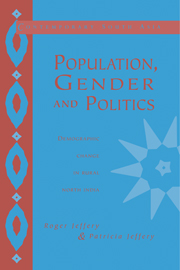Book contents
7 - Conclusion
Published online by Cambridge University Press: 07 January 2010
Summary
So far we have deliberately kept very close to the detail of our case study of Jats and Sheikhs in Bijnor, but here we want to discuss the relevance of this small-scale study beyond the bounds of Nangal and Qaziwala, and Bijnor District. In brief, our study should provoke questions about the current so-called Cairo consensus that women's empowerment via schooling, and fertility and morality decline inevitably go hand-in-hand. Our criticisms of this consensus are highlighted by our approach, which stresses the need to contextualize, to specify the content of schooling as well as its meaning to those involved, in order to understand demographic change. Finally, our account can provide insights into the emergent political situation in India.
The Cairo consensus
The 1994 Cairo Conference on Population and Development accepted the argument that the ability of women to control their own sexuality is an important element in fertility decline. Indeed, this was the starting point for our research in 1990. At Cairo, direct attempts at reducing fertility were given less overt priority than women's empowerment. Feminist rhetorics were adopted, and some tantalizing shifts in vocabulary were adopted by the major donor agencies. Women's rights – broadly as well as in the sphere of reproduction – are now part of the official agenda. ‘Empowerment’ is a term much bandied about and used to legitimize inputs into the educational sector, while the notion of ‘unmet needs’ for contraception is brought in to support the case for empowering women so that they can achieve the small families they are said to want.
- Type
- Chapter
- Information
- Population, Gender and PoliticsDemographic Change in Rural North India, pp. 254 - 260Publisher: Cambridge University PressPrint publication year: 1997
- 1
- Cited by



